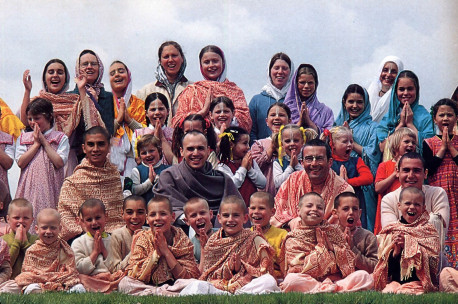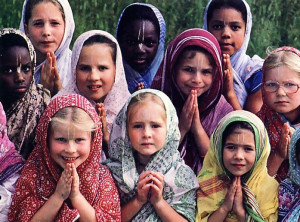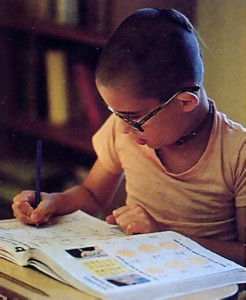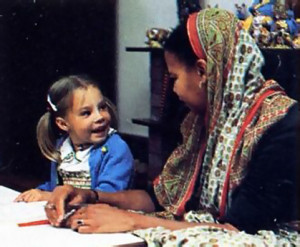Will the crisis in American education
extend to Krsna conscious schools?
by Kundali dasa

In May of this year, my wife and I had our first child, a boy. Since his birth, I’ve had to answer many questions from relatives about my intentions for his future education. They were mostly concerned to know whether the education from a gurukula, a Krsna conscious parochial school, would be comparable to one from a public school. They also wanted to know if my son would be prepared and encouraged to go on to college. Some of them expressed fears that a Krsna conscious education would be too limiting, insulating the child and making him overly dependent on the Krsna conscious way of life. “You never know,” they told me, “he may not want to be a devotee of Krsna when he grows up. You should send him to a public school where he’ll receive a well-rounded education.”
I knew I wouldn’t send my son to public school, and I knew that gurukula education was more than adequate. But how to fully answer my relatives’ questions so that they would be satisfied? I decided to find out about education in America today and see how it compares to a gurukula education.
Like most people in the United States, I’ve known for a long time that public schools are having serious problems. But my research revealed a situation far more criticial than I had imagined. Most of the information I found painted a dismal picture. Probably the most gloomy one was the report by the National Commission on Excellence in Education (NCEE) that came out in early 1983. After an eighteen-month study, the commission turned in its report card:
—Twenty-three million Americans are functionally illiterate.
—Since 1963, scores on the College Board Scholastic Achievement Tests (SAT) have steadily declined. The average verbal score has fallen fifty points; the average math score, more than forty.
—Enrollment in remedial math courses accounts for twenty-five percent of all math course enrollment in America’s colleges and universities.
—The scholastic achievement of college graduates has grown progressively lower each year. To compensate, many colleges have lowered their academic standards.
—Business and military leaders complain that they must spend millions of dollars for remedial education in basic reading, writing, and simple arithmetic.
The NCEE report made no mention of such prominent problems as drug abuse, truancy, violence, and vandalism. Still, the report was negative enough that, while discussing it in a radio broadcast on April 30, 1983, President Reagan described high-school graduates as “prepared for neither work nor higher education.”
John Silber, president of Boston University, described the situation in more lucid terms: “Today’s high school diploma is a fraudulent credential. . . .What the diploma tells you is that a student was institutionalized for twelve years. That’s all. You wouldn’t know whether the student had been in a prison colony, a reform school, or a place for mental defectives.”
Why is the educational system in the most affluent and powerful nation in the world failing so miserably? The NCEE did not give any specific reasons, but it did give a lengthy list of recommendations. School hoards, the NCEE recommended, should improve the content of science, math, and English classes; set more rigorous standards for testing academic performance; devise methods to use classroom time better; put greater stress on teacher competency; provide better leadership; and increase fiscal support. These measures, the commission decided, if implemented over a period of several years, would rectify the situation.
On the surface, the NCEE recommendations sound practical and reasonable. And a new parent like myself, you might expect, should be optimistic and think, “Good, by the time my child is ready for school, they will have had five years to upgrade the system.”
But I don’t feel optimistic. In fact, I seriously doubt that implementing the commission’s recommendations would significantly improve the quality of education in America. The crisis in education is much more serious and its cause much more fundamental than the NCEE’s report indicated. And, as my research has shown me, this is a view that many educators around the country hold. In their opinion, the commission’s report aimed at relieving only the symptoms of the problem. The report did not even mention the cause underlying the symptoms.
Srila Prabhupada, my spiritual master, has summed up the cause of the crisis in modern education:
Modern civilization has advanced considerably in the field of mass education, hut the result is that people are more unhappy than ever before because of the stress placed on material advancement to the exclusion of the most important part of life, the spiritual aspect. . . . Modern civilization is a patchwork of activities meant to cover the perpetual miseries of material existence. Such activities are aimed toward sense gratification, but above the senses is the mind, and above the mind is the intelligence, and above the intelligence there is the soul. Thus the aim of real education should be self-realization, realization of the spiritual values of the soul (Sri Isopanisad).

As a former student myself, I find that Srila Prabhupada’s conclusion is precise and correct. And, as I mentioned before, a number of educators would agree with his general assessment of the problem. For example, in an interview with U.S. News and World Report, Steven Muller, president of Johns Hopkins University, made essentially the same point, Muller said that the biggest problem in education is that students are not taught values. This situation has developed, he explained, because “education today is rooted in the scientific method, having essentially turned its back on religion. . . . The failure to rally around a set of values means that universities today are turning out highly skilled barbarians.”

Similarly Professor Andrew Oldenquist of Ohio State University says speculations about the decline of American education have been “incomplete and occasionally silly.” In his opinion the problem was caused not by Vietnam or by too much TV or by any number of the myriad causes usually cited. What went wrong, Oldenquist says, “was not a gadget nor an event: it was an idea.” Educators and social scientists in the sixties and seventies developed a relativistic philosophy which ousted “middle-class values” like morals and academic achievement. Replacing these were self-esteem, feeling good about oneself—or in other words, sense gratification. Oldenquist calls it “individualism gone mad.”

But even before the sixties, as far back 1929, Alfred North Whitehead observed that education in America was in a critical state of decline. In The Aims of Education, Whitehead lamented modern education’s teaching a plethora of subjects but failing to impart divine wisdom. He considered this “sad evidence of the defeat of human endeavors.” Thus Whitehead wrote,
So long as we conceive education as merely consisting in the acquirement of mechanical mental aptitudes and of formulated statements . . . there can be no progress; though there be much activity amid aimless rearrangement of syllabuses. . . . You cannot be wise without some basis in knowledge; hut you may easily acquire knowledge and remain bare of wisdom.
Whitehead, who is considered one of the keenest intellects of this century, had the insight to perceive what took more than fifty years to become common knowledge. The schools and colleges, he said. induce “paralysis of thought” by subjecting the pupils to the aimless accumulation of knowledge. Whitehead explained:
The importance of knowledge lies in its use, in our active mastery of it—that is to say, it lies in wisdom. It is a convention to speak of mere knowledge apart from wisdom, as of itself imparting dignity to its possessor. I do not share in this reverence for knowledge as such. . . . That knowledge which adds greatness of character is knowledge so handled as to transform every phase of our immediate experience. It you have much to do with the young as they emerge from school and from university, you soon note the dulled minds of those whose education consisted in the acquirement of inert knowledge.
This is similar to Srila Prabhupada’s calling today’s educational institutions “slaughterhouses”—they kill rather than satisfy what Whitehead called “a youth’s natural craving for wisdom.”
“Slaughterhouses.” “skilled barbarians,” “paralysis of thought,” “mental defectives,” “fraudulent credentials”—certainly these terms conjure up unsavory images. And as a responsible parent, I cringe at the thought of my son’s being subjected to such a system. Clearly America’s schools are in a mess. But how do the Krsna conscious schools compare? Are they also beset with waning academic standards? Are they also without a framework of values, without an idea? Or, are the gurukulas a better alternative to public schools?
Well, it’s impossible to get any substantial data on Krsna conscious schools from the library. Gurukulas are still a fairly recent development in America, and very little data on them has been accumulated. I decided, therefore, to visit a gurukula in Lake Huntington, New York, just a few hours’ drive from where I live in Philadelphia. There I could see for myself what the gurukula environment is like, (Some of my conversation with Murali-vadaka dasa. the gurukula headmaster, appears in the interview below.)
I should point out that at present the Krsna conscious schools in America consist only of elementary- and intermediate-level schools. Children ready for secondary school attend the Bhaktivedanta Swami International Gurukula in Vrndavana, India. That school is big enough lo handle all the secondary school requirements for the Krsna consciousness movement for the time being.
A Krsna conscious gurukula educator aims at providing the very things that Oldenquist, Muller, Whitehead (and Srila Prabhupada) consider most wanting in the public schools: a set framework of values and knowledge that builds character, instills divine wisdom, and leads to self-realization. The idea of gurukula is that regardless of a student’s propensities, aptitudes, social position, or academic abilities, he or she will have been trained to function on the highest principles of human integrity, on the principles of saintliness. The ultimate end is to create a society wherein every citizen will gradually progress toward spiritual enlightenment and love of God, which is the ultimate goal of human life.
In the Bhagavad-gita, the Supreme Personality of Godhead, Krsna, outlines the course of study that leads to such a spiritually enlightened state:
Humility; pridelessness; nonviolence; tolerance; simplicity; approaching a bona fide spiritual master; cleanliness; steadiness; self-control; renunciation of the objects of sense gratification; absence of false ego; the perception of the evil of birth, death, old age, and disease; detachment; freedom from entanglement with children, wife, home, and the rest; even-mindedness amid pleasant and unpleasant events; constant and unalloyed devotion to Me; aspiring to live in a solitary place; detachment from the general mass of people; accepting the importance of self-realization; and philosophical search for the Absolute Truth—all these I declare to be knowledge, and besides this whatever there may be is ignorance.
But the emphasis on spiritual achievement in gurukula docs not mean neglect of academic standards. Test results prove this fact. Academic achievement among students at the Lake Huntington gurukula is higher than average. This came to light in 1981, when the gurukula students took the Wide Range Achievement Test (WRAT). The WRAT is a. standardized state test that schools administer. It measures skills in reading, spelling, and arithmetic, and compares them with the scores of students nationally. Sixty-three percent of the gurukula students were approximately 2.5 grades above average in reading, 1.8 grades above in spelling, and 0.9 above in arithmetic. The remaining thirty-seven percent were about 2.2 grades above average in reading, 1.5 grades above in spelling, and 0.3 above in arithmetic.
But beyond statistics, what I saw at Lake Huntington was most encouraging and attractive. The boys and girls were happy and enthusiastic. They enjoyed a strong camaraderie with each other and with their teachers. And they were exempted from the evils of the public school system.
As with any endeavor, of course, the gurukula system has problems. One unique problem, I found, is that the parents of the students, being themselves products of the public school system, have been poorly trained as candidates for the spiritual discipline of Krsna consciousness. Some parents, therefore, are not always able to live up to the ideal, exemplary standard of Krsna consciousness. And when the children see discrepancies in the behavior of their parents, this tends to work against their gurukula training. The children become confused by the double standard. This is not a major problem, however.
At the Lake Huntington gurukula I met Dr. Lawrence Lilliston, a clinical child psychologist from Oakland University in Michigan. Dr. Lilliston was conducting a study of the gurukula students, covering such categories as cooperativeness, conflict resolution, cognitive functioning, academic performance, emotional maturity, moral reasoning, levels of aggression, and creativity. To the best of my knowledge Lilliston’s is the first such scientific study of the gurukula children. I would have loved to have gotten the results of his work, but, unfortunately, it will be several months before all his data is collected and analyzed and the results published.
Dr. Lilliston was willing, however, to discuss with me his initial impressions, as long as I made it clear that his work is not funded by the Krsna consciousness movement and that he had no vested interest in any particular outcome. He told me he was certain that analysis of his data would show the gurukula children to be lower than the average in their level of aggression and higher than average in their level of cooperative play and academic achievement. He found the children to be respectful and considerate. He also praised the teachers: “One of the things that really impressed me here is the teaching by example that the teachers do in all phases of the program. This school is unlike anything that I’ve seen. The training is unlike even other parochial schools, and I’ve seen a lot of those.”
I took the opportunity to ask Dr. Lilliston a question my relatives had put to me: “Do you find the emotional and psychological development of these children normal, or would you say they were unable to think for themselves, learned things by rote, and lacked personality?” To this he replied. “The bottom-line statement, in my opinion, is that this is a very healthy environment. Generally, I find the students to be mentally quite healthy, quite stable, to have a good sense of where they are, who they are, and so on. Gurukula is a wonderful atmosphere in which kids can learn.”
As an advocate of the Krsna consciousness philosophy and life, I’m naturally predisposed toward the gurukula system of education. I am pleased, therefore, to say that the Lake Huntington gurukula is above average academically and also offers an incomparable opportunity for a child to develop sound moral values, greatness of character, divine wisdom and self-realization. I feel satisfied that my son will be able to get the best all-around education in a Krsna conscious gurukula such as the one I saw at Lake Huntington.
An Interview with Murali-vadaka dasa
Murali-vadaka dasa is the headmaster of ISKCON’s gurukula at Lake Huntington, New York, and has worked with that project for the past three-years. Prior to joining the Krsna consciousness movement, he taught for four years in the New York City public school system and was director of a children’s summer camp in New Hampshire for eight years. He was also a social worker in New York City.
What are the major differences between gurukula and public schools?
“Two major differences are prominent in my mind, although one may stem from the other. The first is that in the Krsna consciousness movement we have standards by which we educate our children. That is absent in the public schools. In fact, the opposite is predominant—that is, the concept of subjective or relative morality. Whatever Suzy thinks is right is right for her. Whatever Tommy thinks is right is right for him. From a Krsna conscious point of view, this leads to so many problems—lack of moral strength, lack of character.
“In gurukula we have a standard, an absolute standard. Because Krsna is the Supreme Personality of Godhead, the Absolute Truth, the children learn math, social studies, science—everything—in relation to the Absolute Truth. Krsna. Nowadays, the direction of sociopsychology is that if you maintain some absolute standard—’This is right and this is wrong’—it’s labeled as a ‘value-judgment.’ Value judgments are no-no’s. Because there is no standard, homosexuality is now a ‘normal’ thing.
“The superiority of the character of children raised according to a set standard was brought home to me when the state inspected our school. Three inspectors reviewed our teachers’ credentials, reviewed the curriculum, reviewed the textbooks, and then asked to observe the classroom for a few hours. We walked into the first classroom. All the students stood up with folded hands and smiled. The inspectors said. ‘We’ve seen enough,’ and walked out. Then we got a letter saying our school provided equivalent education. Next they called to tell us unofficially that they wished the mood of learning and love in our school was present in their schools.
“The second major difference, and this is based on my personal experience, is that public school teachers don’t really care about teaching. They want money. Students can see the teachers don’t really care, and so they don’t care about their teachers. Our teachers build strong personal relationships with each child, and they are required to be exemplary in their behavior. But public school teachers can be degenerates and debauchees. As long as they are fairly discreet about it and report to classes, fine. In gurukula we teach by example. It is better than precept.”
Do you have a discipline problem?
“According to a Gallup poll, discipline is the biggest problem in public education. At gurukula, however, the problem is minimal. The teachers see themselves and the students as servants of Krsna. And their responsibility is to train Krsna’s other servants, the students, in the art of pure devotional service. This vision fosters a relationship of love and trust between teachers and students. When there is love and trust, there is obedience. Then a child wants to please his teacher, and discipline becomes a very simple thing.”
Are gurukula students cloistered?
“A lawyer who visited here told me, ‘Your children are cloistered. Why don’t you give them a choice?’ I said, ‘Oh, no. Your children don’t have a choice. Our children understand both Darwinism and creation according to Krsna. * (* ‘See “How He Creates” on page 8.) In the public schools, however, they are taught only Darwinism. You’re the one not giving a choice.’ He agreed. It’s illegal to teach God’s position in the public schools.
“On the practical level, our children get plenty of exposure to the world. They help with the community shopping. They compare prices, talk with the salespeople, figure their change. They know how to interact with society at large. And they go out preaching door to door. Plus our community here is open to the public. They are insulated, not isolated. They may not know what it means to he a pimp on Times Square, but I don’t think they have to know that.
“Other children have no choice. They have no opportunity to know what devotion is. Not one of them can tell you the benefits of celibacy. They think it’s sick. Our children can tell you about sex life, about why everyone is mad after it, but they can also tell you the benefits of celibacy. They certainly have a choice.”
Does gurukula stress spirituality too much?
“Srila Prabhupada said, ‘Our gurukula system is designed to bring one to the platform of pure, unalloyed devotion to Krsna.’ We are not interested in comparative IQ tests, or teaching our children trivial details. But Srila Prabhupada also stressed that our students should not be seen as foolish.
“Academically, our children are two or three grades superior to public and private schools. And we are not even all expert teachers, nor do we have the resources that others invest. But these children can certainly stand with the others. About one year ago they entered a statewide poetry contest, and three of our children won in different areas.
“As they get older, they’ll be guided to specialize in the subjects or crafts that they show a particular propensity for. We don’t waste time, money, and effort to educate a person beyond the intermediate level in a whole range of subjects that he or she has no interest in or desire to learn. Mass education, or education for education’s sake, is a mistake as far as we are concerned.”
What about higher education?
“There’ll definitely be facility for that. But our goal is not to produce children who can go to college. They will be competent to enter the universities, but we are more interested in producing saintly devotees of God.”
What about the criticism that God has been taken out of the public schools?
“We differ from other groups who make that complaint. They may object that God is taken out of the schools, but they cannot answer the questions, Who is God? What is He like? Where does He live? What are His activities? Only the Vaisnava philosophy, Krsna consciousness, answers these questions. No one else can.
“For example, we had a visitor here who told me, ‘Sufism means selfless devotion to God.’ I asked him, ‘Who is God?’ He didn’t know. So I said, ‘Let’s say I cook you a very nice apple turnover, hut you hate apples. What good is my so-called devotion and love for you? Unless I know you and how to please you, all my talk about love and service to you is just sentimental speculation.'”
Will gurukula accept children of nondevotee parents?
“Yes, we already have. There are five children in this school whose parents are not and do not profess to be devotees. Because of the moral training and the character-building and the protection children get here, we anticipate that more and more intelligent, pious members of society will want to send their children here. We are straightforward, and the parents understand, ‘You send your children here and they’ll he trained, along with the good standard of education and character-building, to become devotees of Krsna.’ For parents who are really concerned about their children’s future, there is no alternative to gurukula. Any unbiased observer can see that.”

Hare Krsna How is it they these kids were above private schools in terms of academics. I thought private schools were better than public. and that private schools are good in terms of academics.
Hare Krishna Prabhuji/Mataji, Dandavat Pranamam,
How to join in Gurukula , pls guide us in detail. We are located in Hyderabad